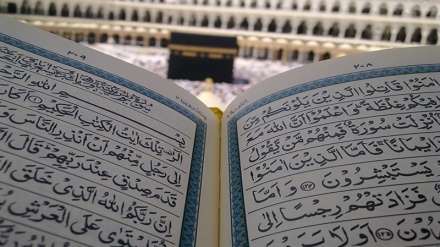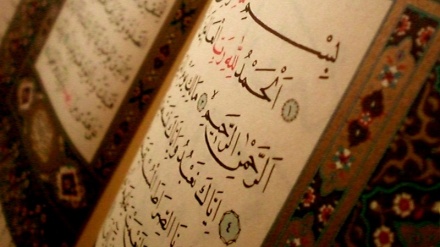Path towards Enlightenment (1038)
Welcome to our latest episode of “Path towards Enlightenment”, which is an endeavour to make you and us familiar with an easy and fluent explanation of God’s Final Scripture to all mankind, the holy Qur’an that was revealed to the Last and Greatest of all Messengers, Prophet Mohammad (blessings of God upon him and his progeny).
In our previous episode we completed explanation of “Surah Ma’arej” and today we start explanation of the next Surah, that is, “Surah Nooh” – the number 71 in the serial order of compilation of the holy Qur’an.
It was revealed in Mecca and has 28 Ayahs. It opens with an account of Prophet Noah, hence its title “Nooh”. It sheds light on the relentless efforts of this ancient Prophet to guide the obstinate disbelievers to the path of monotheism and virtue by warning them of Divine Punishment before the massive flood that finally drowned them for their sins and idol-worship. The disbelievers of his time had transgressed all moral bounds. If they had availed of the centuries’ long respite given to them by the All-Merciful Creator, and repented and reformed themselves, they would have been spared of the terrible punishment. The message of this Surah is that pagan superstitions and cults do not add to human knowledge or well-being. They only increase error, evil, corruption and injustice.
Noah is the first of the Five Great Prophets – the other four being Abraham, Moses, Jesus and the Last and Greatest of them all, Prophet Mohammad (blessings of God upon him and his progeny. He lived the longest timespan and is the only Prophet whose mission of 950 years is mentioned in the Holy Qur’an. Ordered by God Almighty, he built the huge Ark to rescue a pair of every kind of animals and the small number of people who were on the right path, and thus he succeeded in the deliverance of the virtuous among mankind and other species of living things from the great flood.
Glimpses of Noah’s mission are also found in the Surahs A’raaf, Younus, Houd, Anbiya, Momenoun, Shu’ara, and Ankabout:
There are several merits in the regular recitation of this Surah.
Here we present you Ayahs 1, 2, 3, and 4:
“In the Name of Allah the All-Compassionate the All-Merciful – Indeed We sent Noah to his people, [saying,] ‘Warn your people before a painful punishment overtakes them.’
“He said, ‘O my people! Indeed I am a manifest warner to you.
“Worship Allah and be wary of Him, and obey me,
“That He may forgive you of your sins and respite you until a specified time. Indeed when Allah’s time comes, it cannot be deferred, should you know.’”
Prophets would often apply two methods for the guidance of people. They would give good tidings for those who were virtuous and abstained from disbelief and sins. For the disbelievers and sinners, they would warn them of the consequences of their sins and lack of faith in the Almighty Creator. Prophet Noah applied these two methods for the guidance of the people, many of whom, however, rejected his wise words, ridiculed him, and continued their ways of polytheism and sins. He also told them to avail of Allah’s mercy and the respite given by the Almighty Creator to review their lifestyle, repent of their misdeeds, and reform themselves –so at to be forgiven and be saved from Divine Wrath.
These Ayahs teach us that:
- Prophets were raised in various nations by the Almighty Creator to guide people on the path of monotheism and virtue, by abstaining from idolatry and sins.
- The good ones should be given tidings of Paradise in order to encourage the others, while the disbelievers and sinners ought to be warned of the dire consequences of their misdeeds, in a polite and rational manner.
- Mere claim to belief in Allah is of no avail unless the teachings of the Prophets are diligently followed.
- Faith and performance of righteous deeds results in forgiveness of past misdeeds.
Now let us listen to Ayahs 5, 6, 7, 8, and 9 of the same Surah:
“He said, ‘My Lord! Indeed I have summoned my people night and day
“But my summons only increases their evasion.
“Indeed whenever I have summoned them, so that You might forgive them, they would put their fingers into their ears and draw their cloaks over their heads, and they were persistent [in their unfaith], and disdained in arrogance.
“Again I summoned them aloud,
“And again appealed to them publicly and confided with them privately.’”
These Ayahs indicate Prophet Noah’s complaint to the Almighty Creator regarding the intransigence of the overwhelming majority of people who mocked at his words of wisdom, while some of whom would put fingers into their ears to avoid listening to him or would cover their heads with cloaks so as not to see him eye-to-eye. Noah, however, didn’t stop his preaching whether publicly or in private for several centuries, exercising utmost patience for the sake of guiding them.
These Ayahs teach us the following points:
- Prophets never got tired of their mission to guide the people, even if it meant persecution and suffering physical harm.
- Arrogance and intransigence prevent many people from acknowledging and accepting the manifest truth.
- Guidance and invitation to the right path should be done both publicly and in private discourses.
In conclusion of this week’s episode of Path towards Enlightenment, here are Ayahs 10, 11, 12, 13, and 14 of Surah Nooh:
“So I told them, ‘Plead to your Lord for forgiveness.
“Indeed He is All-Forgiver.
“He will send for you abundant rains from the sky, and aid you with aid and sons, and provide you with gardens and provide you with streams.
“What is the matter with you that you do not look upon Allah with veneration?
“Though He has created you in [various] stages.’”
These Ayahs indicate Prophet Noah’s recounting to the people of God Almighty’s Infinite Mercy and Abundant Bounties for the true believers as well as for those who give up idolatry and sins by adopting a life of virtue. The people who repent and reform themselves will surely be forgiven, as is evident by the rains which fall everywhere resulting in the growth of useful vegetation and formation of streams that enable mankind to irrigate the land and derive benefit from it. Good deeds definitely result in increase of blessings of the natural environment enabling human beings to set up fruitful gardens and ponder upon the Gifts of God the Almighty Creator of mankind and the whole universe, Who has decreed various stages for the proper growth and development of mankind. The increase in verdant gardens and offspring as well, are among the bounties of Allah as indication of the prosperity in afterlife, while famine, untimely deaths, and the barrenness of women are among the signs of God’s displeasure.
From these Ayahs we learn that:
- Forgiveness benefits both worldly life and the blessings of afterlife.
- Rain and water are the elixir of life for human beings and all other creatures, so we ought to ponder on these facts, and thank God for His mercy.
- Spirituality and material life are in harmony with each other, and ensure the proper progress of sound and healthy societies.
- The various stages of our life are food for thought for us to reflect on the numerous bounties of the Almighty Creator.
RM/AS/SS


